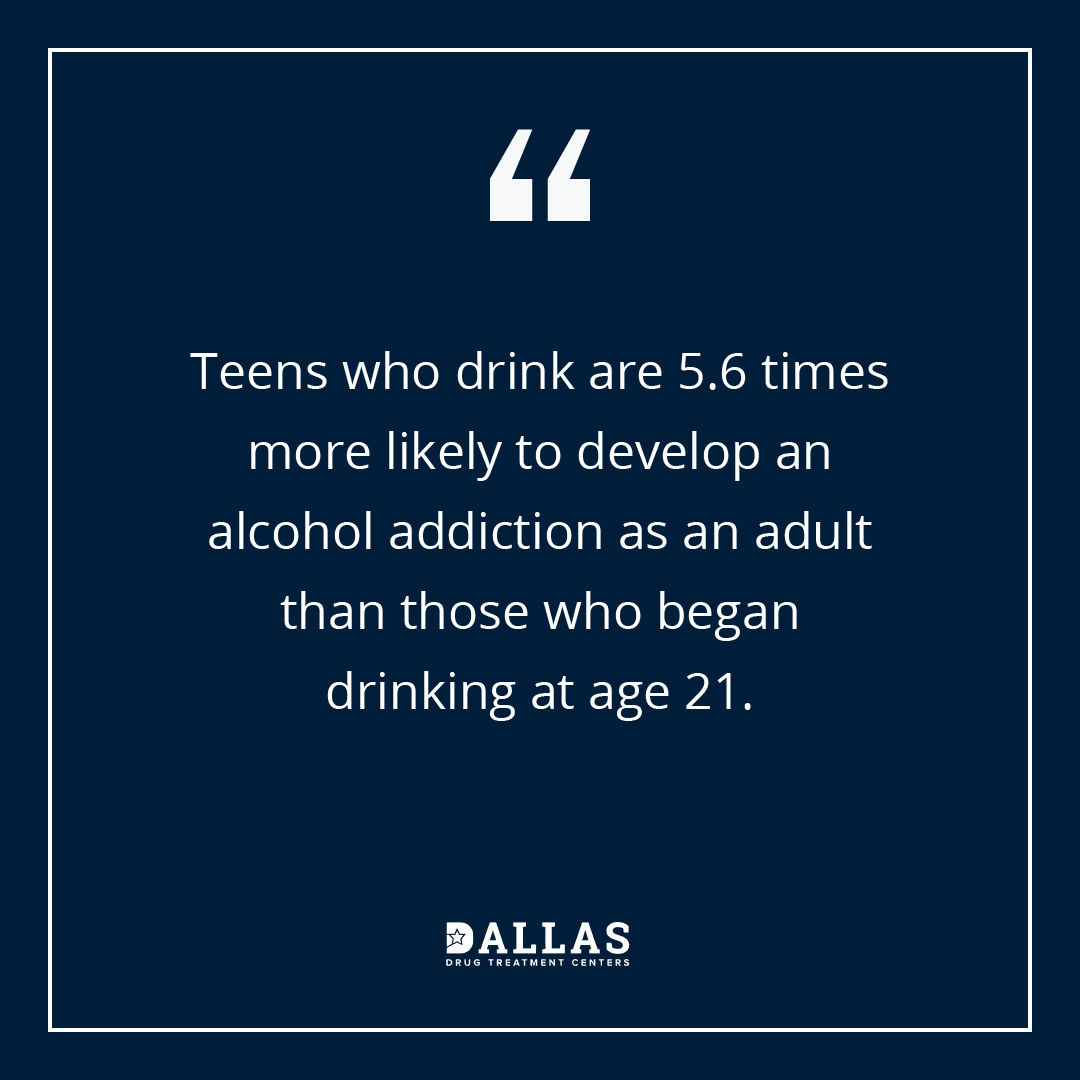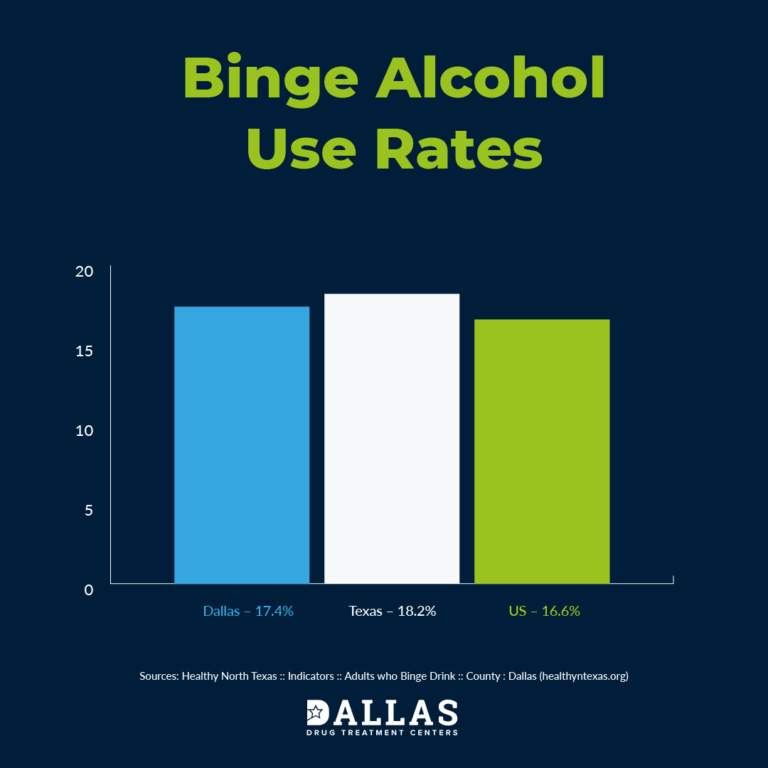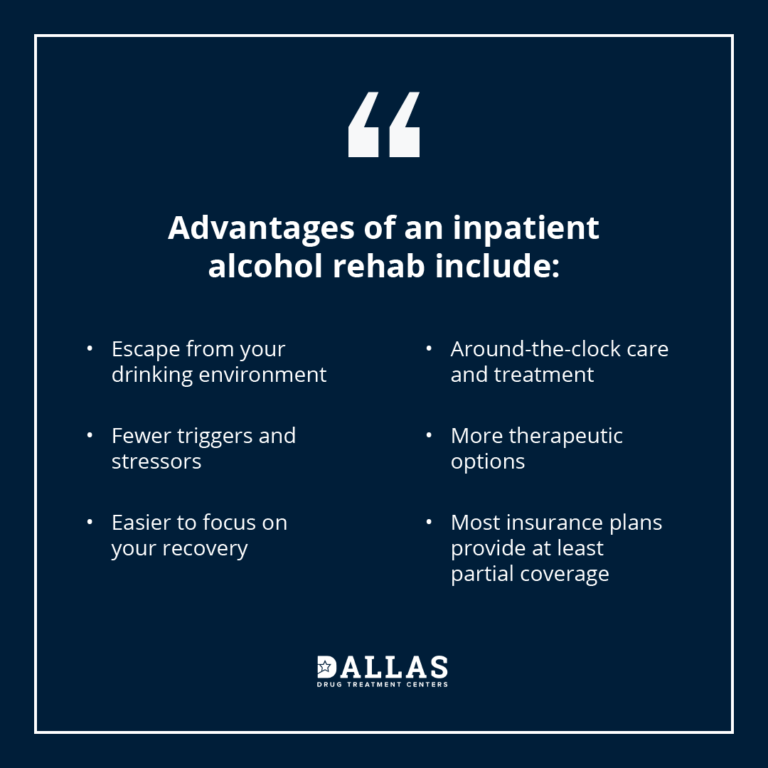
The Scope of Alcohol Abuse in Texas
Alcohol use disorder (AUD) is a growing concern in the United States, and North Texas is no exception. In Texas, alcohol is the leading substance associated with substance use disorder (SUD) and treatment admissions.1
Underaged drinking is a considerable problem in all of Texas as well. Nearly 19% of Texas residents between the ages of 12 and 20 report past-month alcohol use—that’s equal to 662,000 underage drinkers.2 Teens who drink are 5.6 times more likely to develop an alcohol addiction as an adult than those who began drinking at age 21.3

Signs of an Alcohol Addiction
Alcohol addiction, or alcohol use disorder, is characterized by a compulsive pattern of drinking despite the negative consequences of alcohol abuse. Often, alcoholism begins when you engage in binge drinking episodes—this binge drinking may escalate to alcohol dependence and eventually, alcohol addiction. In Texas, more than one in six individuals engage in binge drinking, and all these people are at risk of developing AUD.4
It may be difficult to know if you or someone you love is struggling with alcoholism. However, there are common signs and symptoms that may indicate an addiction to alcohol, including:5
- Consuming more alcohol or spending more time drinking than planned
- Failing to limit or stop alcohol use, despite efforts to do so
- Spending an excessive amount of time drinking, feeling sick, and coping with the after-effects of drinking
- Experiencing strong cravings for alcohol
- Drinking disrupts your ability to manage your responsibilities
- Continuing to drink despite problems with family, friends, and loved ones
- Choosing to drink over participating in things that were once enjoyable or important to you
- Repeatedly drinking in dangerous situations, such as while driving
- Continuing to drink despite knowing that alcohol use is causing or worsening a physical or mental health condition
- Experiencing blackouts during drinking episodes
- Requiring larger amounts of alcohol to get drunk
- Experiencing withdrawal symptoms when you reduce or stop drinking

Dallas Alcohol Rehabs
No matter how severe your alcohol addiction, entering an alcoholism treatment program offers hope for the future. These alcohol rehab programs give you the tools need to obtain and maintain sobriety in the long run. If you are looking to make positive changes in your life, rehab will be your best option for lasting recovery.
There are two different types of rehab treatment available, inpatient alcohol rehab and outpatient alcohol rehab. Each treatment setting has its pros and cons, and ultimately, the best Dallas alcohol rehab for you will depend on your treatment priorities and preferences. With a relapse rate of 40-60%, it’s essential that you find an alcoholism treatment program that works best for you and your needs.6
Inpatient Rehab
In an inpatient alcohol treatment program, you will live at the facility for the duration of your treatment there. You could be there anywhere from 30 days to 180 days. You and your treatment team will discuss the length of time you will be in rehab during your intake assessment—this can always change, though, depending on your progress and particular needs.
The advantages of an inpatient alcohol rehab include:
- You are separated from your drinking environment
- You are in a serene, trigger-free environment
- You can focus solely on your alcohol recovery
- You receive 24/7 care and treatment
- You receive individualized attention
- You may receive many different therapies and interventions
- Many insurance plans provide at least partial coverage for inpatient treatment
Some disadvantages may include:
- Higher cost than outpatient treatment
- You must take a break from working or attending school
- You are unable to fulfill other obligations in your life while away at treatment
- You may need to arrange care for your child or pet

Outpatient Rehab
Outpatient alcohol rehab centers are non-residential treatment facilities that offer three options for the setting in which you will be working on your recovery. These include:
- Partial hospitalization: Patients reside at home but attend alcohol treatment sessions up to 7 days a week for several hours each day.
- Intensive outpatient: Patients reside at home but commute to the treatment center a few days a week. They attend therapy and other classes for a few hours on the days they attend the facility.
- Standard outpatient: Patients reside at home and attend classes and group therapies a couple of days each week for a couple of hours on those days.
Outpatient centers for alcohol addiction usually include group and individual counseling and behavioral treatments. Outpatients can receive care at these facilities with a minimal time commitment.
A person struggling with alcohol use disorder may not always have the resources or desire to take off work to get help. One of the pros of an outpatient program is that the patient can maintain other aspects of their life, like work or school obligations.
Cons of an outpatient program are that chances of relapse are much higher, round-the-clock care is not possible, and often family triggers cannot be addressed while a person continues to live in the stressful environment.
What is a Dallas Alcoholism Treatment Program Like?
It’s not always easy to know how or when to seek help for your alcohol addiction. Different treatment programs have different philosophies and features. Yet, most of these will include many standard therapies, such as:
- Medical detox
- Psychotherapy
- Group counseling
- Drug education classes
- Family therapy
- Support group meetings
- Medication management
Some Dallas alcohol treatment programs use holistic methods like yoga or meditation to help their clients find peace during and after a rehab stay, while others follow the 12-step model to achieve long-term sobriety. Many will integrate the principles of Alcoholics Anonymous (AA) in their treatment program.
Some will offer medical interventions when necessary. They may prescribe medications to ease alcohol cravings and prevent relapse. Medications for alcohol addiction include:7
- Acamprosate
- Naltrexone
- Disulfiram
How to Find a North Texas Alcohol Rehab
There are many ways to overcome your alcohol use disorder, but the most important thing is that you must be committed to your recovery.
Dallas Drug Treatment Centers can help you find an alcohol rehab program where you can learn to live a substance-free life. Call us 24 hours a day on our confidential helpline at 1 (214) 935-2287 to speak to find a Texas alcohol rehab that’s right for you.
Frequently Asked Questions about Alcoholism
Can a Person Overdose on Alcohol?
Yes. It’s called alcohol poisoning and it is a very serious condition that can be fatal if left untreated. Signs of alcohol poisoning include:8
- Nausea
- Vomiting
- Severe confusion
- Weak pulse
- Irregular heartbeat
- Difficulty breathing
- Unconsciousness
- Seizures
If you suspect that you or someone you know has alcohol poisoning, call 911 immediately and seek medical attention.
What Health Problems are Associated with Excessive Alcohol Use?
Excessive drinking can lead to numerous health problems, including (but not limited to):9
- Cirrhosis of the liver
- Pancreatitis
- Certain cancers
- High blood pressure
- Accidental injuries
How Do I Know if I Have a Problem with Alcohol?
You may have an alcohol problem if your drinking has severely impacted your life and made it unmanageable. It could be negatively affecting your relationships, or you may not be meeting your responsibilities. Also, if it is affecting your mental or physical health, you may have a problem.10
How Do I Find an Alcohol Treatment Center Near Me?
Treatment specialists at Dallas Drug Treatment Centers can help you find an alcohol addiction rehab near you. We will help you determine what type of treatment will best suit your needs and help you find both inpatient and outpatient care. Just give us a call at (214) 935-2287.
Alcohol Treatment Resources:
- National Drug Early Warning System. (2018). Texas sentinel community site (SCS) drug use patterns and trends, 2018.
- Vincent, MS.Ed, R. M. (2018). Texas State Report Underage Drinking Prevention and Enforcement. Stop Alcohol Abuse.
- U.S. Department of Health and Human Services. (n.d.). Underage drinking. National Institute on Alcohol Abuse and Alcoholism.
- Substance Abuse and Mental Health Services Administration. (2019). 2016-2017 NSDUH State-Specific Tables.
- American Psychiatric Association. (2013) Diagnostic and Statistical Manual of Mental Disorders, Fifth Edition (DSM-5)
- National Institute on Drug Abuse. (2020, July 10). Treatment and recovery.
- National Institute on Alcohol Abuse and Alcoholism. (2021, May 31) Frequently asked questions: Searching for alcohol treatment.
- National Institute on Alcohol Abuse and Alcoholism. (2018). Understanding the Dangers of Alcohol Overdose.
- Centers for Disease Control and Prevention. (2020, May 30) Fact Sheet – Alcohol Use and Your Health.
- Esser, M.B., Hedden, S.L., Kanny, D., Brewer, R.D., Gfroerer, J.C., Naimi, T.S. Prevalence of alcohol dependence among US adult drinkers, 2009–2011. Preventing Chronic Disease 11, 140329.
